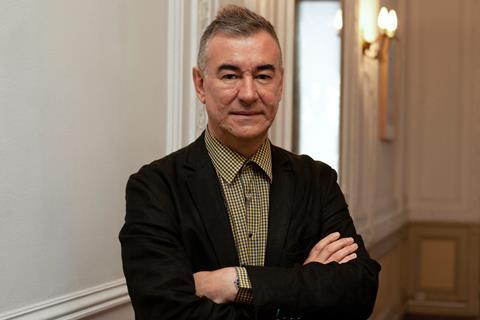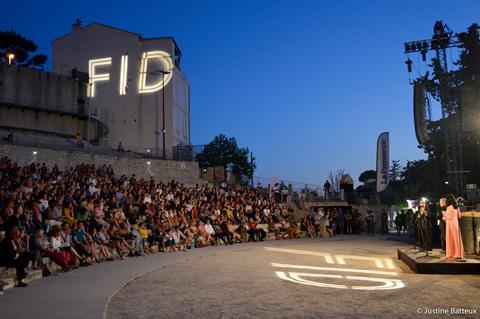
The 32nd FIDMarseille (July 19-25) got off to a rousing, rollicking start earlier this week with the Marseilles-born poet, actor, songwriter and former Manchester United footballer Eric Cantona appearing alongside rock musician Rodolphe Burger at an outdoor concert. Cantona and Burger featured in the festival’s opening film, Mano A Mano, from directors Priscilla Telmona and Mathieu Moon Saura, which was shot during the “spring of the poets” festival in Arles.
Other notable guests in town this week include Larry Clark, the US director of Kids and Ken Park, who is presenting the European premiere of his new short, A Day In A Life, co-directed with Jonathan Velasquez. Also in town and fresh from Cannes, is revered Thai auteur Apichatpong Weerasethakul, recipient of FIDMarseille’s Grand Prix d’Honneur An Apichatpong retrospective is playing to full houses in Marseilles includes his latest film, Memoria which won the Jury prize in Cannes. He has also given a masterclass at the festival.
FIDMarseille was one of the few festivals that managed to stage a physical edition in 2020. It has done so again this year. Festival director Jean-Pierre Rehm reports that close to 3,000 films were submitted before around 110 were selected for a programme that freely mixes documentaries and fiction.
Why did you choose Mano A Mano as opening film?
For the opening, we wanted something that was multi-dimensional. There was the film. Eric Cantona was there. And then there was a live performance of the rock band. It was this combination. Eric Cantona is from Marseilles. People know him mainly as a footballer or lately as an actor and now they discover a writer and also a rocker. He says briefly in the film that he has been writing since he was 17. It’s very interesting that this guy was writing poems and he says that it was an urge.

The opening was free entry. It was open air, a big 2,500 seat theatre. Many people I am sure just came to touch or see on the ground Eric Cantona. The beauty of it was that he was dancing actually with all the audience when the rock band played. It was also a way to say ’don’t believe you are stuck somewhere. You can also cross borders’.
Other festivals are now increasingly programming both documentaries and fiction films but that is something you have done for a number of years. Why the mix?
Documentary used to be in the name [Marseille Festival Of Documentary Film] and we’ve kept the ‘D’ in the name which is maybe a mistake. But for maybe now 10 years, it has been an international cinema festival. We welcome any kind of proposal, be it animation, fiction or documentary. I prefer to say ‘cinema.” I think we were one of the first to do this. It’s not a decision you take alone. You watch what people are actually doing. There are so many filmmakers who do not care about this definition [between documentary and fiction].
You have a large number of world premieres this year. Why is that important for the festival?
It allows us to say ’we are going for these films’. We stand for them, we are fighting for them. We are proposing an idea of cinema, of what it can be.
Is there a story behind the selection of Larry Clark’s co-directed short A Day In A Life?
It is a French co-production and features Vincent Macaigne, a well-known French actor. It’s in the Flash Competition for short films. Larry says this film is very much related to a feature to come that he has said will be his last feature. I don’t know if that’s right. So many people say they won’t shoot any more but they go on hopefully. It is something very dense, very engaging, [with] a very Larry Clark essence.
How does the industry engage with FIDMarseille?
We have FIDLab which took place online in June. It is about pitching and discussing and so there is no harm done to the material itself [by being online]. This is our industry-specific moment. Otherwise, we welcome the sales agents and there always are a lot of other festivals that are here to scout.
You have a few films that also screened in Cannes, either in official selection or the Directors’ Fortnight. What is your relationship with Cannes?
This is the first time we are so close ([n dates]. There are four films coming from Cannes but these films are connected also with us. Diego Marcon’s film The Parents’ Room was at FIDLab as was Payal Kapadia’s A Night Of Knowing Nothing. And with Miguel Gomes and Maureen Fazendeiro, directors of Journal de tûoa, it’s a very ancient friendship. I care for these people. I care for their films. It’s not because they were in Cannes that I pick them.
Otherwise, we don’t have so many Cannes films. It’s very rare. Maybe one, maximum two…Directors’ Fortnight head Paolo Moretti was also part of the selection committee here at FIDMarseille for 10 years.
And finally, please talk about the decision to honour Apichatpong Weerasethakul this year.
Apichatpong’s first film, Mysterious Object At Noon, was screened first in France here at FIDMarseille. From then on, we have been screening his films on a regular basis and he has been coming to the festival and has been a member of the Jury. More important than that, Apichatpong’s films are huge enterprises…he is one of the few ‘immense’ living artists. Great, great artists are very few and he is one of them.

























No comments yet